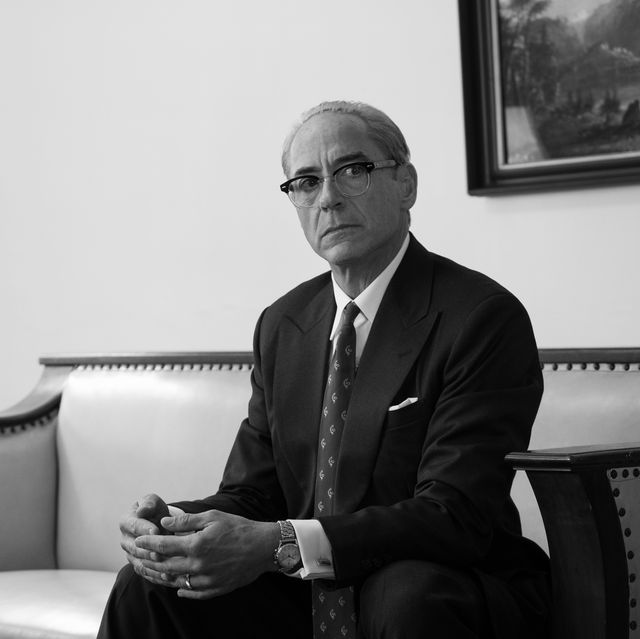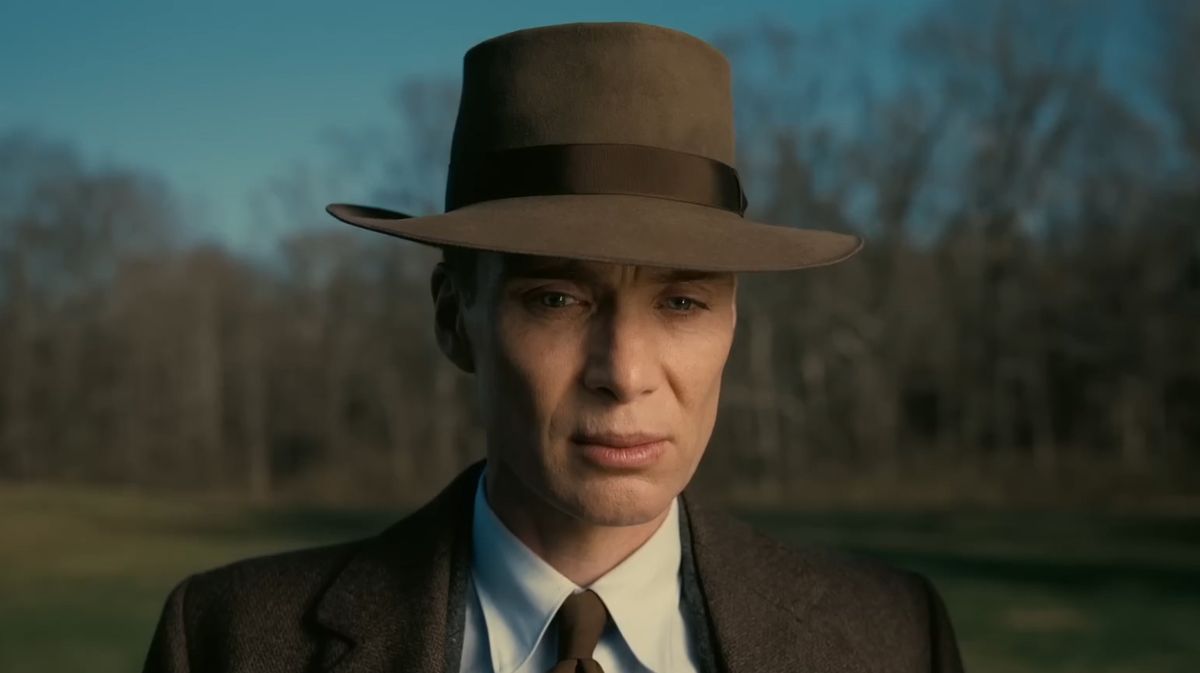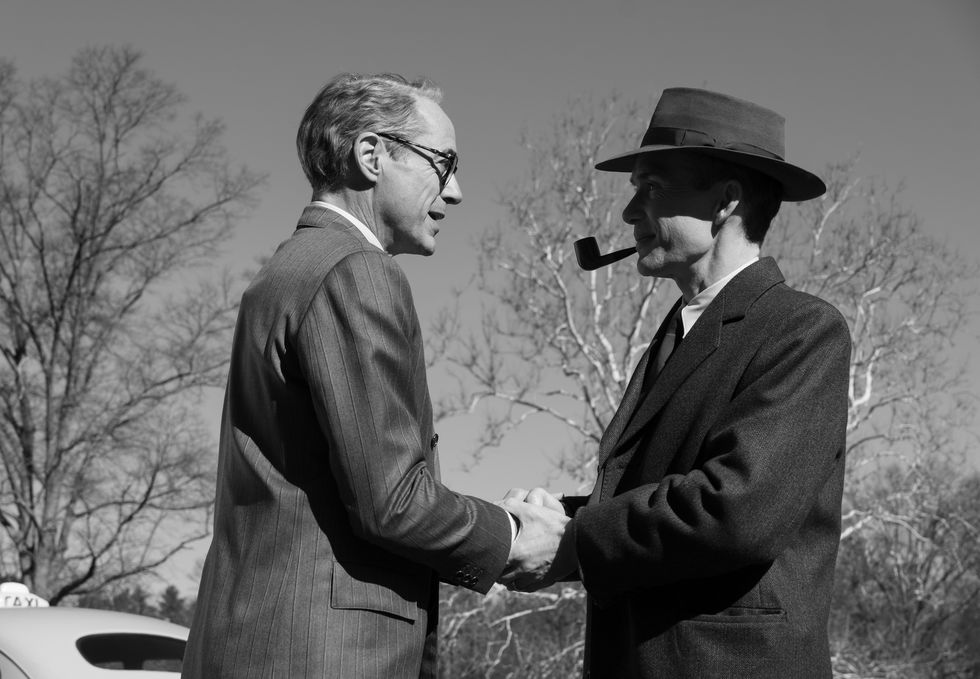Oppenheimer is light on laughs, but in its final moments, there’s something that comes close to one (at least, in my screening at Waterloo’s IMAX, a few people chortled: it’s a long film, perhaps they were tired). It does not belong to man of the three hours J. Robert Oppenheimer (played by Cillian Murphy), but Robert Downey Jr.’s character, Charles Strauss, who manages to paint himself, with an exquisite flair for self-sabotage, into a corner. At the end of Christopher Nolan’s film, it’s a rare moment of levity: a welcome release after many sequences of frantic laboratory research and boardroom debates. It also, handily, provides Downey Jr. the opportunity do his best work in years.
The biopic-cum-thriller-cum-science lesson, which is out today, charts the uh, explosive success of the American scientist, who studied at multiple esteemed institutions – including England’s very own Cambridge University, where he tried to murder his teacher with a poisoned apple – before settling at Los Alamos Laboratory in the Californian desert to begin the work for which he is most (in)famous: The Manhattan Project. Though the rough beats of this story are well-known for anyone who has ever taken a GCSE History lesson, Nolan brings some of the political intrigue to a wider audience. Well, wider: the film is adapted from the 2005 Pulitzer Prize-winning book entitled American Prometheus: The Triumph and Tragedy of J. Robert Oppenheimer (phew! They sure know how to write a book title!), which explores Oppenheimer’s studies, political interests, personal relationships, and legacy.
One beat that plays particularly well on the big screen is Oppenheimer’s relationship to ambitious career politician Strauss. Nolan clearly thought so, as a lot of the film’s momentum is borne from the pair’s disagreements. While Oppenheimer touches on their linked heritage – both men descend from Jewish families, at a time where there is open hostility overseas and more concealed discrimination at home – Strauss is necessarily flattened into an antagonist. With his conservative values, he dislikes the liberal Oppenheimer, though the thrust of their antagonism stems from the hydrogen bomb. Oppenheimer was against developing a weapon even more powerful than the atomic bomb, while Strauss was in favour of exactly that. The film’s structure, which comprises some deftly-handled timelines, does draw out Strauss’ complications: a moral duty, his external ambitions, deep insecurity. (The final of these traits provides the film with a through-line involving Einstein.)
Downey Jr. is barely recognisable. With slick-backed grey hair, receded hairline and horn-rimmed glasses, he doesn’t look much like Downey Jr. the person, and even less like Downey Jr. the very famous actor. I am not sure if you have spent much time on Robert Downey Jr.’s IMDB page, but the broad brush strokes of his career are well-known: young success in films like Less Than Zero (the adaptation of Brett Easton Ellis’ debut novel) was followed by substance abuse issues before a career comeback in the mid-2000s. His renaissance – before Matthew McConaughey’s, if you can believe it – was marked by an was Oscar-nominated role in Tropic Thunder (the film itself has aged less well) and as scene-stealing journalist Paul Avery in Zodiac (this film has aged pretty well).
The following two decades have been marked by some serious creative troughs. There were attempts at critical acclaim (Joe Wright’s The Soloist), complete misfires (Dolittle) and imprisonment by a very red, very shiny, very constrictive suit. There are three Iron Man films, three Avengers films, and he appears in a Captain America doo-dah, too. It says a lot about Downey Jr.’s output in this year that his best work was in a retelling of Sherlock Holmes (which is actually watchable stuff).
Oppenheimer, then, allows Downey Jr. to inhabit a new character completely, one that doesn’t rely on his rough and ready charm, and actually manages to work against his likability. Perhaps that’s the privilege of ageing. It is certainly a refreshingly grown-up role for the 58-year-old, a part which relies on what he does not say, rather than what he does. Downey Jr. has likened the roles of Oppenheimer and Strauss to Mozart and Salieri. That shorthand – evoking the fictional rivalry between true-genius Mozart and successful-in-his-time Salieri – almost works, though in this film, Strauss mostly just fails. It’s to Downey Jr.’s credit that Strauss is a compelling villain, rather than a cliché one.
Oppenheimer is in cinemas now
Henry Wong is a senior culture writer at Esquire, working across digital and print. He covers film, television, books, and art for the magazine, and also writes profiles.














